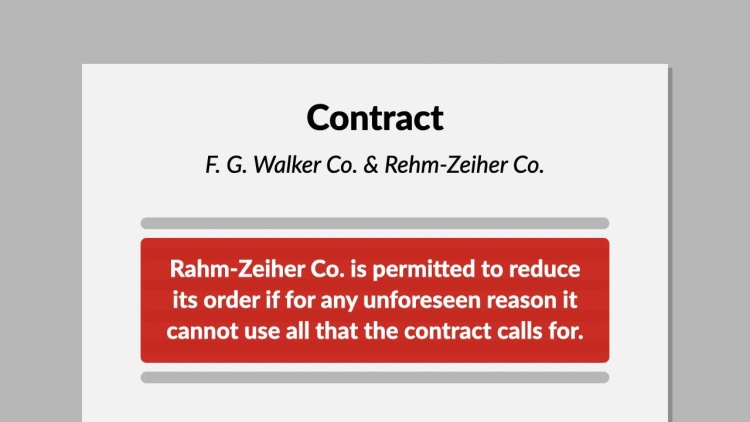Rehm-Zeiher Co. v. F.G. Walker Co.
Kentucky Court of Appeals
160 S.W. 777, 156 Ky. 6 (1913)
- Written by Megan Petersen, JD
Facts
Rehm-Zeiher Co. (Rehm-Zeiher) (plaintiff) was a seller of whisky. It purchased whisky from distilleries and sold the whisky at market price. F.G. Walker Co. (Walker) (defendant) owned and operated a whisky distillery. On November 17, 1908, Rehm-Zeiher and Walker entered into a contract providing that Rehm-Zieher would purchase gradually increasing quantities of whisky from Walker from 1909 to 1912. Under the contract, Walker was to provide 2,000 cases of whisky in 1909; 3,000 cases in 1910; 4,000 cases in 1911; and 5,000 cases in 1912. Walker was excused from performance in case fire destroyed its products or distillery. Rehm-Zieher was permitted for “any unforeseen reason” to refuse to accept and pay for either all or part of each delivery of whisky. In 1909, Rehm-Zeiher only ordered and received 786 of the 2,000 cases called for in the contract. In 1910, Rehm-Zeiher only ordered and received 1,200 of the 3,000 cases called for in the contract. In 1911, the price of whisky significantly increased. Walker furnished to Rehm-Zeiher 1,044 of the 4,000 cases called for in the contract that year and refused to deliver any more. Rehm-Zeiher brought suit in Kentucky state court alleging that Walker breached the contract by refusing to deliver more than 1,044 cases in 1911, and seeking damages of $6,798. After trial, the judge directed a verdict for Walker on the ground that the contract between Rehm-Zeiher and Walker lacked mutuality of obligation and was thus unenforceable. Rehm-Zeiher appealed.
Rule of Law
Issue
Holding and Reasoning (Carroll, J.)
What to do next…
Here's why 907,000 law students have relied on our case briefs:
- Written by law professors and practitioners, not other law students. 47,100 briefs, keyed to 996 casebooks. Top-notch customer support.
- The right amount of information, includes the facts, issues, rule of law, holding and reasoning, and any concurrences and dissents.
- Access in your classes, works on your mobile and tablet. Massive library of related video lessons and high quality multiple-choice questions.
- Easy to use, uniform format for every case brief. Written in plain English, not in legalese. Our briefs summarize and simplify; they don’t just repeat the court’s language.





